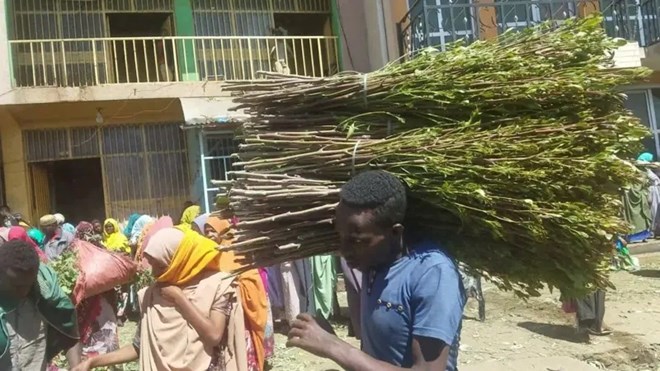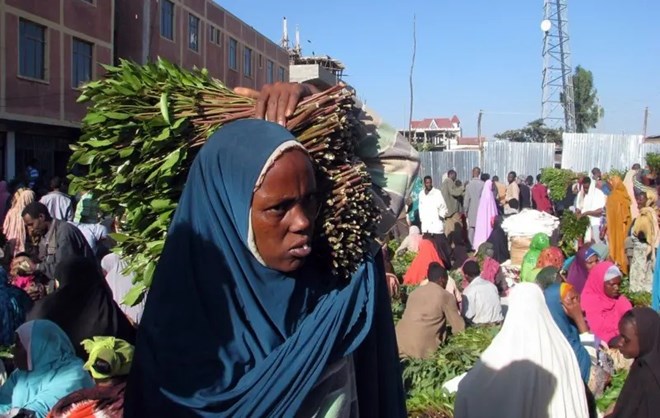
Thursday December 5, 2024

An Ethiopian worker carries a large bundle of khat, a stimulant crop that plays a vital role in the country's economy, at a local market. Khat trade disruptions have impacted farmers, traders, and regional economies.
Kismayo (HOL) — Ethiopia is grappling with a sharp decline in revenue from khat exports, a lucrative trade that supports millions of farmers and drives its foreign exchange earnings. The downturn, driven by tax policies, logistical hurdles, and shifting market dynamics, is also felt in Somaliland, one of the Horn of Africa's largest khat consumers.
During a parliamentary session on Monday, Ethiopian lawmakers demanded answers about the decline in khat revenues. Kassahun Gofe, Ethiopia's Minister of Trade, attributed the drop to three factors: boosting farmers' incomes, increased reliance on foreign exchange, and higher taxes imposed by regional states.
Khat is Ethiopia's second-largest export after coffee, and its importance cannot be overstated. The crop sustains rural livelihoods and represents a critical revenue stream for the federal government and regional administrations. However, internal roadblocks—283 checkpoints across Ethiopia—have disrupted transport routes, forcing traders to use informal pathways.
The knock-on effect is evident in Somaliland, where khat prices have surged. Khalid Abdi Nur, an economist and lecturer at the University of Hargeisa, noted, "Prices have doubled in recent months, placing additional strain on Somaliland consumers." He added that contraband trade is rising as traders bypass official customs to smuggle khat through remote routes.
Unregulated khat is increasingly entering Somaliland via alternative routes, including Balli Gubadle and Balli Dhiig. This shadow trade undermines both Ethiopian export revenues and Somaliland's customs collections.
"Khat that used to sell for $4 per bundle now fetches $8," Khalid explained. "Smuggling has created a parallel economy that is nearly impossible to regulate."
Somaliland's dependence on Ethiopian khat remains significant. According to Khalid, the region spends an estimated $180 million annually on khat imports from Ethiopia, with daily imports valued at approximately $500,000. This reliance underscores the economic interdependence of the two regions, even as contraband trade destabilizes the market.
The Ethiopian government faces mounting pressure to stabilize khat revenues while balancing regional and federal tax policies. For Somaliland, the surge in contraband highlights the need for stronger border controls and economic diversification.
A woman carries a bundle of khat at a bustling market in Ethiopia, highlighting the crop's critical role in the livelihoods of many communities despite ongoing economic challenges and trade disruptions
- With files from the BBC